Global Social Commerce Market: By Business Model, By Application, By End-User, By Region & Segmental Insights Trends and Forecast, 2024 – 2034
- Industry: Technology
- Report ID: TNR-110-1107
- Number of Pages: 420
- Table/Charts : Yes
- May, 2024
- Base Year : 2024
- No. of Companies : 10+
- No. of Countries : 29
- Views : 10247
- Covid Impact Covered: Yes
- War Impact Covered: Yes
- Formats : PDF, Excel, PPT
Social commerce is the integration of social media platforms and e-commerce, enabling users to discover, share, and purchase products directly within social media environments. This seamless blend leverages the power of social interactions, user-generated content, and personalized recommendations to drive online sales. By utilizing features like shoppable posts, live streaming, and influencer partnerships, social commerce creates a more engaging and interactive shopping experience. It allows brands to connect with consumers in real-time, fostering trust and loyalty. As a result, social commerce not only enhances customer engagement but also provides businesses with valuable insights into consumer behaviour and preferences, ultimately driving growth and innovation in the digital marketplace.
The integration of shopping features within popular social media platforms enhances convenience and user experience. Secondly, influencer marketing and user-generated content build trust and authenticity, encouraging purchases. Thirdly, the rise of mobile usage ensures accessibility and ease of shopping anytime, anywhere. Lastly, personalized marketing and targeted ads enable businesses to reach the right audience effectively, boosting engagement and conversion rates. These elements collectively propel the growth of social commerce. Despite its growth, social commerce faces several restraining factors.
Privacy concerns and data security issues can deter consumers from engaging fully on these platforms. Additionally, the oversaturation of ads and promotional content may lead to ad fatigue, reducing user engagement. Technical challenges, such as integrating seamless checkout processes and handling logistics, also pose significant hurdles. Lastly, varying regulations across regions regarding online sales and advertising practices can complicate global expansion efforts for businesses relying on social commerce.
In terms of revenue, the global social commerce market was worth US$ 948.2 Bn in 2023, anticipated to witness CAGR of 30.2% During 2024 – 2034.
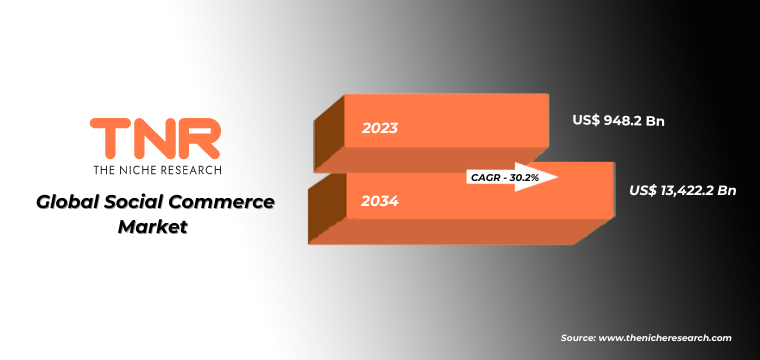
Global Social Commerce Market Dynamics
Increased Social Media Usage: The widespread adoption of social media platforms provides a large and engaged user base, ideal for integrating shopping experiences. Influencers and content creators drive product discovery and trust, leveraging their large followings to promote products and brands effectively.
Mobile Commerce Growth: The proliferation of smartphones and improved mobile internet connectivity enable users to shop conveniently via social media apps. Social commerce allows for highly personalized marketing, utilizing user data to tailor product recommendations and advertisements.
Privacy and Data Security Concerns: Consumers are increasingly wary of sharing personal information online, fearing data breaches and misuse of their data, which can deter engagement in social commerce. The oversaturation of advertisements and promotional content on social media can lead to user disengagement and skepticism, reducing the effectiveness of marketing efforts.
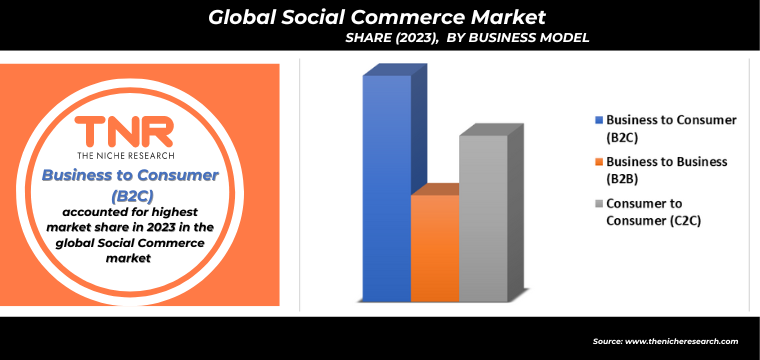 Business to Consumer (B2C) Has garnered major market share in the Global Social Commerce Market During the Forecast Period (2024 – 2034).
Business to Consumer (B2C) Has garnered major market share in the Global Social Commerce Market During the Forecast Period (2024 – 2034).
The widespread adoption of social media platforms serves as a fertile ground for businesses to engage directly with consumers, tapping into their preferences and behaviours. Influencer marketing amplifies product visibility and credibility, leveraging the influential power of personalities to drive purchasing decisions. Moreover, the seamless integration of e-commerce functionalities within social media environments simplifies the path to purchase, enhancing convenience and immediacy for consumers. Personalized shopping experiences, facilitated by data analytics and AI algorithms, deepen consumer engagement and loyalty. Lastly, the interactive nature of social commerce, including live streaming events, user-generated content, and real-time customer support, fosters authentic connections between brands and consumers, fostering trust and brand advocacy in the digital age.
By Application Apparel Segment had the Highest Share in the Global Social Commerce Market in 2023.
The visual nature of social media platforms provides an ideal showcase for apparel products, allowing brands to captivate consumers with visually appealing content and storytelling. Influencer collaborations play a pivotal role, as fashion influencers curate stylish looks and inspire followers to emulate their style, effectively driving product discovery and demand. The rise of shoppable posts and interactive features within social media platforms further streamlines the purchasing journey, enabling seamless transitions from inspiration to transaction.
Additionally, the trend towards personalized shopping experiences, fueled by AI-driven recommendations and user-generated content, enhances consumer engagement and satisfaction, as shoppers find apparel items tailored to their preferences. Social commerce also facilitates social validation and peer recommendations, as users share outfit photos, reviews, and recommendations with their networks, fostering a sense of community and trust. Ultimately, the dynamic fusion of social media and e-commerce redefines the fashion landscape, empowering consumers to discover, engage with, and purchase apparel products in an immersive and socially connected environment.
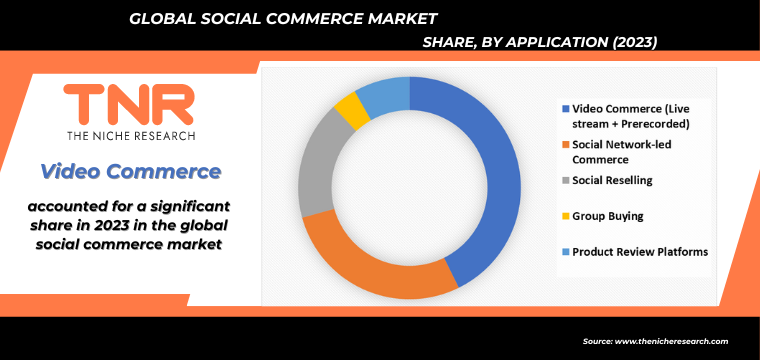
By End User Video Commerce Segment had the Highest Share in the Global Social Commerce Market in 2023.
Video commerce, encompassing both live streaming and prerecorded content, is a powerful demand driver within social commerce platforms. The immersive and interactive nature of video content significantly enhances consumer engagement, making it an effective tool for showcasing products. Live streaming allows brands and influencers to demonstrate products in real-time, answer questions, and provide immediate feedback, creating a sense of urgency and authenticity that drives purchase decisions.
Prerecorded videos, on the other hand, offer detailed product information and can be repeatedly accessed, serving as valuable resources for consumers at any stage of their buying journey. Social commerce platforms like Instagram, Facebook, and TikTok integrate these video formats seamlessly, enabling users to shop directly through links embedded in the videos. This convenience, combined with the visual appeal of video content, enhances the shopping experience and reduces the friction between product discovery and purchase. Additionally, interactive elements such as clickable tags, in-video polls, and viewer comments further engage the audience, fostering a sense of community and trust. Overall, video commerce leverages the strengths of social media to create a dynamic and compelling shopping environment that drives consumer demand.
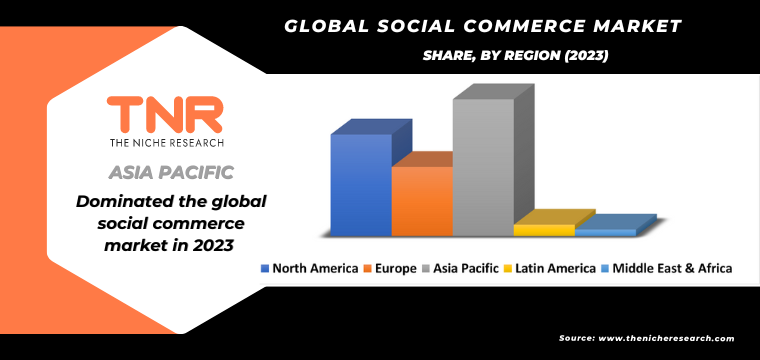
Asia-Pacific has garnered major market share in 2023 in the global social commerce market. The widespread adoption of smartphones and high internet penetration rates provide a vast, connected audience. Platforms like WeChat, TikTok, and LINE dominate the social media landscape, seamlessly integrating e-commerce features that facilitate effortless shopping experiences. The region’s strong culture of influencer marketing boosts product visibility and consumer trust, as influencers wield significant sway over purchasing decisions. Additionally, the preference for mobile payments and the innovative use of technologies such as AI and AR enhance personalized shopping experiences. These elements combine to create a robust ecosystem where social commerce thrives, meeting the demands of tech-savvy consumers and driving significant market growth.
Competitive Landscape: Global Social Commerce Market:
- Alibaba
- Amazon
- Etsy, Inc.
- Fashnear Technologies Private Limited (Meesho)
- Meta Platforms, Inc. (Facebook)
- Pinduoduo Inc.
- Pinterest, Inc.
- Poshmark
- Roposo
- Snap, Inc.
- Taobao
- TikTok (Douyin)
- Trell Shop
- Twitter, Inc.
- WeChat (Weixin)
- Xiaohongshu
- Yunji Sharing Technology Co., Ltd.
- Other Industry Participants
Global Social Commerce Market: Key Takeaways
| Report Specifications | Details |
| Market Revenue in 2023 | US$ 948.2 Bn |
| Market Size Forecast by 2034 | US$ 13,422.2 Bn |
| Growth Rate (CAGR) | 30.2% |
| Historic Data | 2016 – 2022 |
| Base Year for Estimation | 2023 |
| Forecast Period | 2024 – 2034 |
| Report Inclusions | Market Size & Estimates, Market Dynamics, Competitive Scenario, Trends, Growth Factors, Market Determinants, Key Investment Segmentation, Product/Service/Solutions Benchmarking |
| Segments Covered | By Business Model, By Application, By End-User |
| Regions Covered | North America, Europe, Asia Pacific, Middle East & Africa, Latin America |
| Countries Covered | U.S., Canada, Mexico, Rest of North America, France, The UK, Spain, Germany, Italy, Nordic Countries (Denmark, Finland, Iceland, Sweden, Norway), Benelux Union (Belgium, The Netherlands, Luxembourg), Rest of Europe, China, Japan, India, New Zealand, Australia, South Korea, Southeast Asia (Indonesia, Thailand, Malaysia, Singapore, Rest of Southeast Asia), Rest of Asia Pacific, Saudi Arabia, UAE, Egypt, Kuwait, South Africa, Rest of Middle East & Africa, Brazil, Argentina, Rest of Latin America |
| Key Players | Alibaba, Amazon, Etsy, Inc., Fashnear Technologies Private Limited (Meesho), Meta Platforms, Inc. (Facebook), Pinduoduo Inc., Pinterest, Inc., Poshmark, Roposo, Snap, Inc., Taobao, TikTok (Douyin), Trell Shop, Twitter, Inc., WeChat (Weixin), Xiaohongshu, Yunji Sharing Technology Co., Ltd. Other Industry Participants |
| Customization Scope | Customization allows for the inclusion/modification of content pertaining to geographical regions, countries, and specific market segments. |
| Pricing & Procurement Options | Explore purchase options tailored to your specific research requirements |
| Contact Details | Consult With Our Expert
Japan (Toll-Free): +81 663-386-8111 South Korea (Toll-Free): +82-808- 703-126 Saudi Arabia (Toll-Free): +966 800-850-1643 United Kingdom: +44 753-710-5080 United States: +1 302-232-5106 E-mail: askanexpert@thenicheresearch.com
|
Global Social Commerce Market
By Business Model
- Business to Consumer (B2C)
- Business to Business (B2B)
- Consumer to Consumer (C2C)
By Application
- Personal & Beauty Care
- Apparels
- Accessories
- Home Products
- Health Supplements
- Food & Beverage
- Others
By End User
- Video Commerce (Live stream + Prerecorded)
- Social Network-led Commerce
- Social Reselling
- Group Buying
- Product Review Platforms
By Region
- North America (U.S., Canada, Mexico, Rest of North America)
- Europe (France, The UK, Spain, Germany, Italy, Nordic Countries (Denmark, Finland, Iceland, Sweden, Norway), Benelux Union (Belgium, The Netherlands, Luxembourg), Rest of Europe)
- Asia Pacific (China, Japan, India, New Zealand, Australia, South Korea, Southeast Asia (Indonesia, Thailand, Malaysia, Singapore, Rest of Southeast Asia), Rest of Asia Pacific)
- Middle East & Africa (Saudi Arabia, UAE, Egypt, Kuwait, South Africa, Rest of Middle East & Africa)
- Latin America (Brazil, Argentina, Rest of Latin America)
Report Layout:
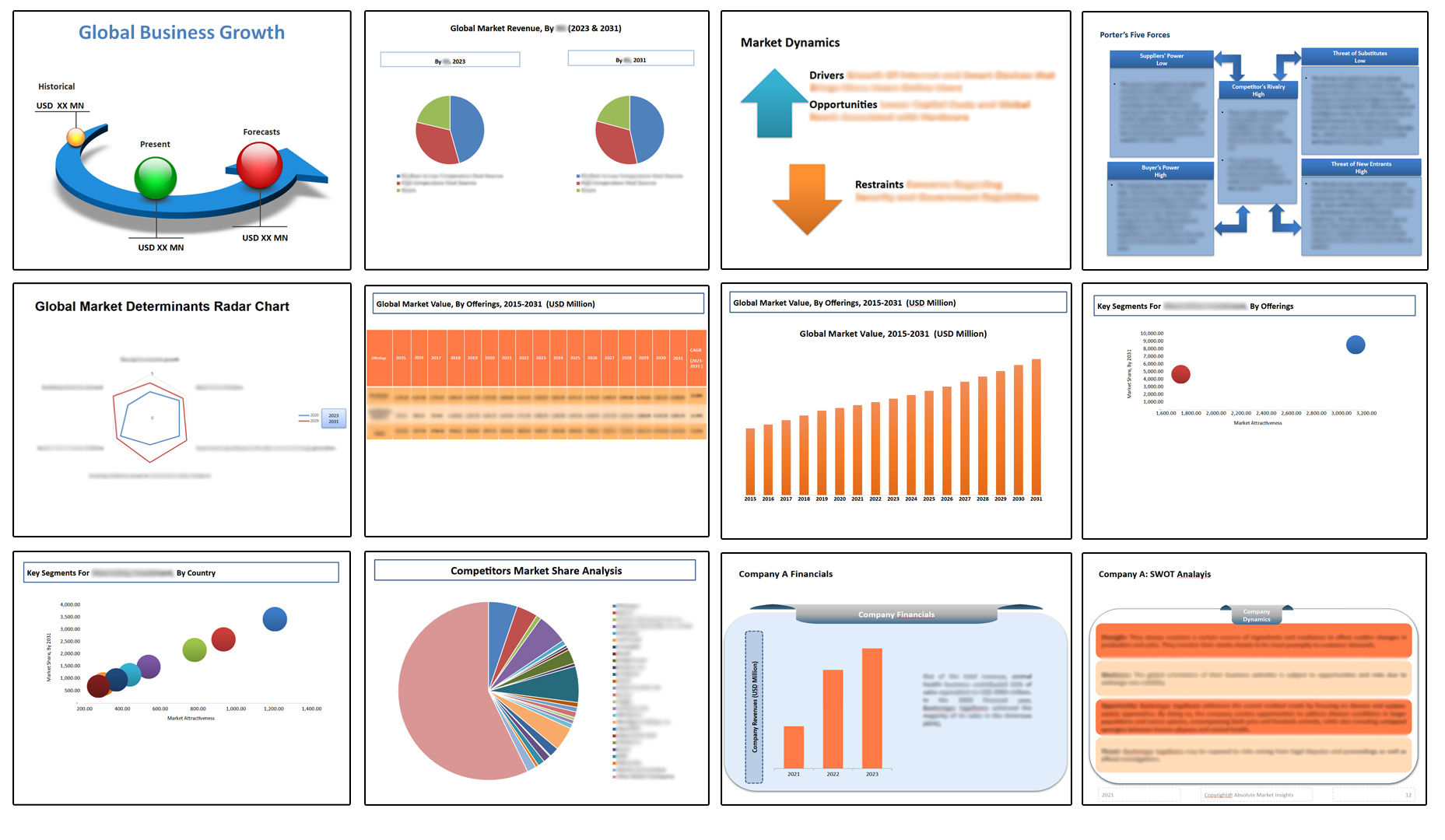
Table of Contents
**Exclusive for Multi-User and Enterprise User.
Global Social Commerce Market
By Business Model
- Business to Consumer (B2C)
- Business to Business (B2B)
- Consumer to Consumer (C2C)
By Application
- Personal & Beauty Care
- Apparels
- Accessories
- Home Products
- Health Supplements
- Food & Beverage
- Others
By End User
- Video Commerce (Live stream + Prerecorded)
- Social Network-led Commerce
- Social Reselling
- Group Buying
- Product Review Platforms
By Region
- North America (U.S., Canada, Mexico, Rest of North America)
- Europe (France, The UK, Spain, Germany, Italy, Nordic Countries (Denmark, Finland, Iceland, Sweden, Norway), Benelux Union (Belgium, The Netherlands, Luxembourg), Rest of Europe)
- Asia Pacific (China, Japan, India, New Zealand, Australia, South Korea, Southeast Asia (Indonesia, Thailand, Malaysia, Singapore, Rest of Southeast Asia), Rest of Asia Pacific)
- Middle East & Africa (Saudi Arabia, UAE, Egypt, Kuwait, South Africa, Rest of Middle East & Africa)
- Latin America (Brazil, Argentina, Rest of Latin America)
The Niche Research approach encompasses both primary and secondary research methods to provide comprehensive insights. While primary research is the cornerstone of our studies, we also incorporate secondary research sources such as company annual reports, premium industry databases, press releases, industry journals, and white papers.
Within our primary research, we actively engage with various industry stakeholders, conducting paid interviews and surveys. Our meticulous analysis extends to every market participant in major countries, allowing us to thoroughly examine their portfolios, calculate market shares, and segment revenues.
Our data collection primarily focuses on individual countries within our research scope, enabling us to estimate regional market sizes. Typically, we employ a bottom-up approach, meticulously tracking trends in different countries. We analyze growth drivers, constraints, technological innovations, and opportunities for each country, ultimately arriving at regional figures.Our process begins by examining the growth prospects of each country. Building upon these insights, we project growth and trends for the entire region. Finally, we utilize our proprietary model to refine estimations and forecasts.
Our data validation standards are integral to ensuring the reliability and accuracy of our research findings. Here’s a breakdown of our data validation processes and the stakeholders we engage with during our primary research:
- Supply Side Analysis: We initiate a supply side analysis by directly contacting market participants, through telephonic interviews and questionnaires containing both open-ended and close-ended questions. We gather information on their portfolios, segment revenues, developments, and growth strategies.
- Demand Side Analysis: To gain insights into adoption trends and consumer preferences, we reach out to target customers and users (non-vendors). This information forms a vital part of the qualitative analysis section of our reports, covering market dynamics, adoption trends, consumer behavior, spending patterns, and other related aspects.
- Consultant Insights: We tap into the expertise of our partner consultants from around the world to obtain their unique viewpoints and perspectives. Their insights contribute to a well-rounded understanding of the markets under investigation.
- In-House Validation: To ensure data accuracy and reliability, we conduct cross-validation of data points and information through our in-house team of consultants and utilize advanced data modeling tools for thorough verification.
The forecasts we provide are based on a comprehensive assessment of various factors, including:
- Market Trends and Past Performance (Last Five Years): We accurately analyze market trends and performance data from preceding five years to identify historical patterns and understand the market’s evolution.
- Historical Performance and Growth of Market Participants: We assess the historical performance and growth trajectories of key market participants. This analysis provides insights into the competitive landscape and individual company strategies.
- Market Determinants Impact Analysis (Next Eight Years): We conduct a rigorous analysis of the factors that are projected to influence the market over the next eight years. This includes assessing both internal and external determinants that can shape market dynamics.
- Drivers and Challenges for the Forecast Period:Identify the factors expected to drive market growth during the forecast period, as well as the challenges that the industry may face. This analysis aids in deriving an accurate growth rate projection.
- New Acquisitions, Collaborations, or Partnerships: We keep a close watch on any new acquisitions, collaborations, or partnerships within the industry. These developments can have a significant impact on market dynamics and competitiveness.
- Macro and Micro Factors Analysis:A thorough examination of both macro-level factors (e.g., economic trends, regulatory changes) and micro-level factors (e.g., technological advancements, consumer preferences) that may influence the market during the forecast period.
- End-User Sentiment Analysis: To understand the market from the end-user perspective, we conduct sentiment analysis. This involves assessing the sentiment, preferences, and feedback of the end-users, which can provide valuable insights into market trends.
- Perspective of Primary Participants: Insights gathered directly from primary research participants play a crucial role in shaping our forecasts. Their perspectives and experiences provide valuable qualitative data.
- Year-on-Year Growth Trend: We utilize a year-on-year growth trend based on historical market growth and expected future trends. This helps in formulating our growth projections, aligning them with the market’s historical performance.
Research process adopted by TNR involves multiple stages, including data collection, validation, quality checks, and presentation. It’s crucial that the data and information we provide add value to your existing market understanding and expertise. We have also established partnerships with business consulting, research, and survey organizations across regions and globally to collaborate on regional analysis and data validation, ensuring the highest level of accuracy and reliability in our reports.









